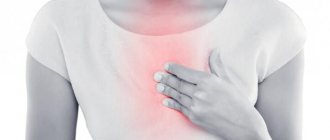Diagnosis and consequences
In order to make a correct diagnosis, the doctor prescribes an examination.
What procedures need to be completed during the examination:
- Gastroscopy.
- X-ray of the stomach.
- Examination of blood for the presence of excess organisms.
- Analysis of gastric juice acidity.
- Less often - checking for worms and E. coli.
If you do not consult a doctor in time, then seemingly harmless symptoms of burning in the esophagus and stomach can develop into serious illnesses, such as:
- Ulcer.
- Chronic gastritis.
- Pancreatitis.
- Stomach bleeding.
One of the most serious diseases that can be caused by exposure of the gastric mucosa to constant large amounts of acid or bile is malignant neoplasm. If you consult a doctor in a timely manner, the tumor can be cured, but if the disease is advanced, then surgery will no longer be possible. Therefore, if your stomach is burning, you should immediately pay attention to it and go to the doctor.
Others
The stomach often burns due to heart disease, angina pectoris, pleurisy, myocardial infarction, and also with increased blood pressure.
If the disease is caused by heart disease, its symptoms are relieved by taking nitroglycerin. But after this, it is better to contact a cardiologist and tell about the alarming symptoms.
A burning sensation in the esophagus often appears due to stress and nervous conditions. In the modern rhythm of life, a person is constantly faced with problems and nervous shocks, which provokes a burning sensation in the esophagus and stomach. Only careful treatment of your nerves will help you cope with this problem.
When taking medications, you need to be careful, as some of them can cause unpleasant symptoms and discomfort. When a doctor prescribes medications that cause hormonal changes, he also prescribes antacid therapy.
Sometimes the burning sensation can be caused by bacterial infections. Once bacteria enter the body, they weaken its barrier functions. Due to such infections, changes occur in the mucous membrane, and ulcers and gastritis appear.
Pregnant women quite often encounter discomfort, as hormonal disruption occurs, the uterus enlarges, and the woman feels pain and heaviness after eating.
The main enemy of the body is alcohol and smoking. They have a bad effect on the entire body, and with stomach diseases, the patient’s condition only worsens. Therefore, you need to give up bad habits.
What to do if heartburn occurs?
If heartburn occurs for the first time as a one-time symptom, then you should reconsider your menu and frequency of meals.
Four nutritious meals a day, which includes breakfast, lunch, afternoon snack and dinner, are important for the proper functioning of the gastrointestinal tract. Snacking on the go or eating a single meal at night will have a detrimental effect on your health in just a month.
The diet should include not only carbohydrates, which give the body energy, but also proteins of plant and animal origin, fruits and vegetables rich in vitamins and fiber. Be sure to maintain water balance by drinking one and a half to two liters of liquid per day.
If work involves heavy physical labor or a person engages in active sports, the volume of water consumed should be increased.
If the burning sensation in the stomach becomes constant, occurs in a hungry state and does not decrease or is slightly dulled after eating, then you should definitely consult a doctor.
The main methods for diagnosing stomach diseases are:
- FGDS with biopsy;
- radiography;
- analysis of gastric juice;
- assessment of gastric microflora.
Before visiting your doctor, you can help yourself:
- Normalize your diet and diet.
- Avoid spicy, smoked and marinated foods.
- Food must be chewed thoroughly and portions should be small.
- If heartburn appears after or while taking any medications, consult your doctor about changing medications or choosing remedies to protect the digestive system.
- You can take enveloping antacids: Almagel, Phosphalugel, etc.
Under no circumstances should you experiment on yourself or self-medicate. Only a doctor can prescribe effective therapy after making a final diagnosis.
Treatment
Often, a burning sensation in the stomach and esophagus appears due to increased acidity in the gastric juice. To eliminate the disease, the doctor prescribes medication.
Important! When prescribing medications, the gastroenterologist takes into account all the characteristics of the patient’s body and the course of the disease. In order for the doctor to quickly identify the disease, you need to tell him about all the manifestations of the disease.
For different cases, the gastroenterologist prescribes different drugs. In addition to medications, a strict diet is required. This is done to normalize metabolism in the body. You need to remove from your diet all foods that can cause flatulence or fermentation processes in the digestive organs.
- Dairy products.
- Vegetable soups.
- Porridge.
- Dietary broths.
- Some vegetables and fruits.
- Dietary boiled meat.
What you need to remove from your diet:
- Drinks containing alcohol and gases.
- Fatty dishes and broths.
- Pickled vegetables.
- Canned food.
- Sweets.
- Fresh baked goods.
- Sausages.
It is recommended to eat at certain times and in small portions. You should stop eating on the go. In order not to encounter symptoms of burning in the stomach and esophagus, you need to adhere to certain rules:
- You should not eat or drink before bed.
- There is no need to buy tight clothes, if they tighten the stomach, this will have a bad effect on its work.
- You should not go to bed immediately after eating; you need to walk or sit for a while, do something.
- It is recommended to sleep on a pillow so that your head is always slightly higher than your torso.
A burning sensation in the esophagus can be relieved if you follow simple rules and adjust your diet. It is recommended to give up bad habits, this will help improve the patient’s health. You can relieve a strong burning sensation in the stomach using traditional methods:
- A remedy that relieves symptoms in almost everyone is to add a teaspoon of soda to a glass of boiled water. The solution should be drunk in small sips. Instead of water, you can drink a glass of milk or chamomile tea.
- Potato juice is also popular to relieve burning sensation in the esophagus. Helps in the treatment of chronic gastritis. This juice can be drunk not only to treat the disease, but also for prevention.
- If the burning sensation occurs frequently, in addition to the medications prescribed by the doctor, you should add crushed buckwheat to your food.
- There are finely ground walnut kernels, you can take no more than 1 tablespoon per day.
- Chew the grains of oats or barley for a long time, at least half an hour, swallow the saliva and spit out the grains.
- There are dry peas.
- There are also remedies: infusion of St. John's wort, apple cider vinegar, burnt magnesia - all of these can treat the disease.
In addition to these remedies, the burning sensation in the esophagus area will be removed by herbal decoctions and mixtures made from them. There are several recipes that will help get rid of the disease, but it is better to consult a gastroenterologist before use, since herbal remedies can be harmful if the concentration is incorrect.
- Finely grind the potato flowers and brew tea from the resulting mixture.
- Chew the calamus roots thoroughly and wash it down.
- Pour hot water over gentian root, heat over low heat for 6-7 minutes, let steep for 30 minutes, strain and drink. You need to take the decoction 3 times a day.
- Pour gentian root with a small amount of vodka and leave to infuse for 3 weeks; drink 2 teaspoons of the product before each meal.
- Pour a small amount of centaury herb with hot water and leave in a thermos overnight. Take in small portions, no more than a tablespoon before meals.
All these remedies have a positive effect on the stomach, actively fight flatulence and remove toxins. Traditional methods help get rid of the symptoms of the disease, but do not cure the cause (focus), therefore, if attacks appear constantly, you need to make an appointment with a gastroenterologist.
To treat a burning sensation in the stomach, the cause of which is unknown, the patient needs to visit a gastroenterologist. He will order an examination and diagnose the disease, since there are many pathologies with similar symptoms, from the most harmless to the serious.
In order to cure the condition when the stomach bakes, many medications have been developed, but only a gastroenterologist can prescribe them correctly.
Medicines
A burning sensation in the esophagus occurs if a person experiences excessive secretion of hydrochloric acid. This means that the doctor, when prescribing a course of therapy, tries to reduce the acidity of gastric juice.
What a gastroenterologist can prescribe:
- Antispasmodics are medications that reduce pain during stomach cramps.
- Drugs that reduce gastric acidity.
- Alginates – they help create a protective lining for the gastric mucosa.
- Enzymes that will help with digestion.
- Probiotics and prebiotics.
Important! If you have a burning sensation in your stomach, you should not prescribe medications without visiting a gastroenterologist. The course of therapy should only be prescribed by a specialist. We must remember that timely and properly selected treatment will help you recover faster.
In addition to medications, a gastroenterologist can prescribe alkaline mineral water, but you must drink it strictly according to the regimen provided by the doctor.
Unpleasant sensations in the stomach, burning sensation periodically bother every person. Such symptoms may appear after eating, emotional shock, or during an exacerbation of certain diseases. You should not ignore these sensations or self-medicate, as this can harm your health. Only a doctor can determine why there is a burning sensation in the stomach, what causes it, but not ordinary heartburn.
Treatment of burning sensation - drugs and folk remedies
After making a diagnosis, the doctor prescribes a comprehensive treatment, aimed primarily not at relieving symptoms, but at eliminating the cause of the burning sensation in the stomach. Of the medications whose action is aimed at eliminating the symptom of burning, the most popular are those containing aluminum and copper - Maalox, Phosphalugel, metal hydroxide and complex salts - Almagel. You can also use De-nol, Tribimola, which, when they enter the stomach, create a protective film in it. If the cause of the burning sensation is a violation of the digestive function, the patient will be prescribed prokinetics, for example Motilium, Itomed.
To eliminate the burning sensation in the stomach, you can use traditional medicine methods:
In the fight against regular causes of burning in the stomach, but not heartburn, other folk remedies will also help, but they should be used for 1-2 weeks.
- Horse sorrel can be added to salads or consumed as an independent product.
- Buckwheat, for this it should be ground into a powder, take half a teaspoon 2-3 times a day.
- Potato juice. It should be taken half a glass a few minutes before meals 3 times a day.
- Osokori powder. You should eat half a tablespoon with a small amount of water 3 times a day.
- Infusions of St. John's wort, chamomile or plantain. The prepared infusion should be drunk several teaspoons before main meals.
The difference between heartburn and a burning sensation in the stomach
The feeling of heat in the stomach should be distinguished from banal heartburn. With it, discomfort is felt in the esophagus.
Heartburn, or reflux esophagitis, is irritation of the esophageal mucosa with stomach contents, followed by inflammation. The reason for this phenomenon lies in the imperfection or dystrophy of the muscles that close the connection of the two organs. In this state, even a small irritant causes gastric juice and food to rise upward.
Heartburn appears when:
- overeating;
- drinking carbonated drinks or fatty foods;
- wearing very tight clothing that compresses the chest and stomach.
With heartburn, there may be no burning sensation in the stomach. Almost always there is a sore throat, a sour or bitter taste in the mouth, nausea, and less often a cough.
The main causes of burning in the stomach
Discomfort and heat in the stomach cause some diseases. The burning sensation provokes irritation of the mucous membrane and pathological changes in it.
Discomfort with gastritis or peptic ulcer
The stomach has a very complex structure. It is formed by several layers of muscle tissue, penetrated by a large number of blood vessels. The stomach contains enzymes from several glands that help digest food. This environment is quite aggressive, muscle fibers are protected from it by the mucous membrane.
In cases where gastric juice changes its acidity, damage and inflammation of the surface of the stomach (gastritis) is possible. If left untreated for a long time, a peptic ulcer may develop. It is expressed in the appearance of changes in the mucous membrane, which periodically bleed.
The sensations in these diseases are similar, they intensify after eating:
- nausea followed by vomiting (sometimes with blood);
- foul-smelling belching;
- severe pain.
The danger of these pathologies is known to everyone: the likelihood of organ perforation and the appearance of a malignant tumor.
Discomfort due to eating habits
A burning sensation in the stomach is very often associated with the way a person eats. Unpleasant sensations appear after eating certain foods and drinks. Among them:
- smoked products;
- fried foods (especially shish kebab);
- canned food and marinades with the addition of vinegar;
- fatty meat and fish;
- sour vegetables or fruits;
- carbonated sweet drinks.
Discomfort may appear after smoking a cigarette or drinking a portion of alcohol. For some people, even coffee and strong tea cause such sensations.
Carrying a child brings a woman not only joy, but also many new, not always pleasant, sensations. These include belching and a burning sensation in the stomach.
After fertilization of the egg, the female body begins to produce large quantities of progesterone. The main function of the hormone is to prevent contractions of the uterus to preserve the fetus. However, progesterone acts not only on the female organs, but also on the stomach and intestines. Their peristalsis slows down, digesting food takes longer, so heat in the stomach and bloating worry every second expectant mother.
The discomfort increases when the baby begins to grow at a rapid pace (in the second and third trimester). It compresses the gallbladder and intestines, which causes excess enzymes to enter the stomach, irritating the mucous membrane.
If a woman has no concomitant diseases, the discomfort disappears after the birth of the baby.
Other causes of stomach discomfort
Burning sensation and attacks of abdominal pain can occur due to stress. The mechanism of their formation is unclear, but only one thing is known for sure: after normalization of the psycho-emotional state, all symptoms disappear.
Bacterial and viral infections that affect the gastrointestinal tract also provoke discomfort in the stomach. This may be the activation of Helicobacter pylori, salmonellosis, E. coli and more.
Heat in the stomach appears with uncontrolled or prolonged use of certain medications: antibiotics or antispasmodics.
Causes and symptoms
Most often, a burning sensation in the stomach occurs due to reflux esophagitis, when the esophageal mucosa comes into contact with intestinal contents. Gastric juice contains a large amount of pepsin, which is involved in the digestion of proteins and the production of hydrochloric acid. It is because of this process that a person experiences discomfort in the stomach area.
The main causes of burning in the stomach, but not heartburn, are:
- Increased production of gastric juice.
- Pathologies of the gastric mucosa - ulcers, gastritis, gastroduodenitis.
- Improper and unbalanced nutrition.
- The presence of pathogenic bacteria in the stomach.
- Worm infestation.
- Disorders of the pancreas.
- Abuse of spicy and fatty foods.
- Drinking alcoholic beverages.
- Stressful state.
- Nicotine addiction.
- Consequences of taking medications.
- Hormonal disorders in the body.
- Pregnancy in women
- Impaired excretion of bile.
The most common cause of burning sensation is poor diet, namely abuse of fried, salty foods, and overeating, which leads to overload of the digestive system.
Medicines can also provoke a burning sensation in the stomach, since, while being a panacea for one disease, they have an extremely negative effect on the functioning of other organ systems. For example, taking antibiotics, destroying beneficial bacteria in the stomach, causes irritation of its mucous membrane. The same effect can occur if the dosage of the drugs is not followed.
However, the most dangerous burning sensation in the stomach is when it is a symptom of certain diseases. So, burning is a characteristic sign of gastritis, that is, inflammation of the gastric mucosa, which leads to digestive problems. With a stomach ulcer, a combination of burning and severe stomach pain is characteristic. The most dangerous disease, which is also characterized by this symptom, is stomach cancer; it can also be accompanied by nausea and vomiting.
Methods of therapy
If the pain and feeling of heat in the abdomen are constant or systematic, you should definitely visit a gastroenterologist. After a series of studies, he will be able to identify what pathology causes such sensations. Diagnosis includes: blood, stool and urine tests; gastroscopy; Ultrasound; If necessary, tissue is collected for cytological examination.
If serious diseases are identified during the study, a certain therapeutic course, diet, and, less often, surgery are prescribed.
If no pathologies in the gastrointestinal tract are detected, one of the following drugs may be prescribed to eliminate symptoms:
To alleviate the condition, you can also use folk remedies (with the permission of your doctor). The most effective:
- Five grams of regular baking soda are stirred in half a glass of warm water or milk and drunk. This method cannot be used often, since the alkaline environment can disrupt the normal balance of acidity in the stomach.
- Buckwheat flour. It is prepared at home and taken during attacks, a teaspoon, washed down with warm liquid. It forms a protective layer in the stomach cavity, which protects against the action of hydrochloric acid and bile.
- Juice from fresh potatoes. Drink 100 ml before meals several times a day. The course of treatment is 1–4 weeks.
In case of unpleasant sensations in the stomach (pain, burning) and to prevent them, you must follow a diet and stop drinking alcohol and smoking.
A burning sensation in the stomach can be a sign of serious pathologies, so if you experience frequent discomfort, you should get examined and follow your doctor’s recommendations.
Sooner or later, almost everyone experiences that feeling as if their stomach is on fire. This sensation can be temporary, that is, a single manifestation, or it can appear every time after eating food or even when inhaling certain specific odors.
In most cases, the stomach begins to burn due to the development of a pathological process, which, without proper treatment, can cause serious harm to the entire body when complications arise.
Basic diagnostic methods
A patient who comes to the hospital complaining of a severe burning sensation in the stomach is sent for examination. Specialists use the following diagnostic methods:
- Gastroscopic examination. A probe is inserted into the patient's stomach through the mouth or anus.
- X-ray.
- Analysis for pathogenic microorganisms.
- pH metric test.
Unpleasant symptoms of gastrointestinal diseases require urgent medical attention.
After examination, identifying problems and determining the causes of their occurrence, the patient is prescribed treatment. Therapy consists of following a diet and giving up bad habits. Fatty and spicy foods are excluded from the diet, and coffee is replaced with herbal teas and dairy products. Rarely does a specialist prescribe additional medications.
Medicines for a burning sensation in the stomach are prescribed by the doctor, depending on the characteristics of the patient’s body:
- No-shpa;
- Omez;
- Festal;
- Phosphalugel, Maalox (contain aluminum and magnesium);
- Almagel (contains complex salts and metal hydroxide);
- Tribimol, De-nol (help stop the inflammatory process by forming a protective film on the walls of the stomach).
The stomach walls are protected from the negative effects of acid with the help of alginates. To eliminate excess acid, take antacids. They do not have a long-lasting effect. Prokinetics are prescribed to improve the functioning of the sphincter and improve digestive function.
Additionally, for burning in the stomach, doctors may prescribe drinking solutions of hydrochloric, citric, acetic acid and mineral water with an alkaline composition. If hydrochloric acid is produced in insufficient quantities, it is recommended to take vitamin B12.
Only a qualified specialist can prescribe medications for a burning sensation in the stomach. The selection of medications is made taking into account the results of the examination, the characteristics of the patient’s body and the reasons that provoked the pain.











